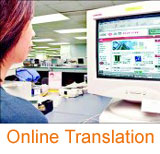
Relying
on online translation tools can be a risky business, especially
if you expect too much of it. For the time being, might translation
be something best left to the humans?
Earlier this month the small German town of Homberg-an-der-Efze,
north of Frankfurt, had to pulp an entire print run of its English-language
tourism brochure - after officials used an internet translating
tool to translate the German text.
According to one report, the brochure was "rendered meaningless"
by the online tool.
Martin Wagner, mayor of Homberg-an-der-Efze, admits that the
town made a "blunder". As a result of officials trying
to save money by getting the Internet to do a translator's job,
a total of 7500 brochures had to be binned.
This story highlights some of the pitfalls of translating online.
There are many instant translation tools on the web - but they
are best used for individual words and short phrases, rather than
for brochures, books or anything complex.
For example, one of the joys of the web is that it grants you
access to an array of foreign news sources. Yet if you were to
use a translation tool to try to make sense of such reports, you
could end up with a rather skewed and surreal view of the world.
Why is foreign text "rendered meaningless" when passed
through an online translation tool? According to Sabine Reul,
who runs a Frankfurt-based translation company, translation tools
have limited uses - and problems arise when web users expect too
much from them.
"A translation tool works for some things," says Reul.
"Say a British company wants to order a box of screws from
a German supplier. A sentence like 'We need one box of a certain
type of screw' is something that a machine could translate reasonably
accurately - though primitively."
Yet when it comes to translating blocks of text - words and sentences
that convey thoughts and sentiments - online tools are bound to
fail, she adds. "Beyond simple sentences, the online process
simply doesn't work because machines don't understand grammar
and semantics, never mind idiom and style."
"Language is not a system of signs in the mechanical sense
of the word", says Reul. "It is a living medium that
is used to convey thought. And that is where machines fail. Human
input is indispensable as long as computers cannot think."
Reul and other translators look forward to the day when clever
computers might help to ease their workload - but that time has
not arrived yet.
"It would be nice if computers could do the job. And certainly
the quest for machine translation has prompted a lot of linguistic
research that may prove valuable in unforeseen ways. But experience
to date confirms that even the most subtle computer program doesn't
think - and you need to be able to think in order to translate."
Until the dawn of thinking computers, online translation tools
are best reserved for words, basic sentences and useful holiday
phrases. For tourism brochures, newspaper reports and the rest,
you will have to rely on some old-fashioned "human input".
(Agencies)
